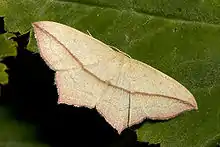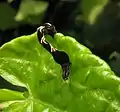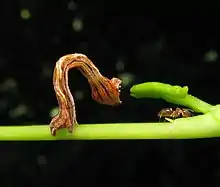Timandra (moth)
Timandra is a genus of moths in the family Geometridae first described by Philogène Auguste Joseph Duponchel in 1829.
| Timandra | |
|---|---|
 | |
| The blood-vein moth, Timandra comae | |
| Scientific classification | |
| Domain: | Eukaryota |
| Kingdom: | Animalia |
| Phylum: | Arthropoda |
| Class: | Insecta |
| Order: | Lepidoptera |
| Family: | Geometridae |
| Tribe: | Timandrini |
| Genus: | Timandra Duponchel, 1829 |
| Synonyms | |
| |
Taxonomy
Timandra was raised by Duponchel and is taken from Greek mythology and is named after the daughter of Tyndareus and Leda.[1]
Description
Palpi not reaching beyond the frons. Antennae of male bipectinate (comb like on both sides). Apex simple. Hind tibia of male with two spur pairs. Forewings with acute and produced apex. Vein 3 from near angle of cell and vein 5 from somewhat above middle of discocellulars. Veins 7, 8 and 9 stalked. Vein 10 anastomosing (fusing) with veins 8 and 9 to form the areole. Hindwings with produced outer margin to a point at vein 4, veins 6 and 7 from angle of cell.[2]
Species
- Timandra amaturaria Walker, 1866
- Timandra apicirosea (Prout, 1935)
- Timandra comae Schmidt, 1931
- Timandra commixta Warren, 1895
- Timandra comptaria (Walker, 1863)
- Timandra convectaria Walker, 1861
- Timandra dichela (Prout, 1935)
- Timandra extremaria Walker, 1861
- Timandra griseata Petersen, 1902
- Timandra paralias (Prout, 1935)
- Timandra recompta (Prout, 1930)
- Timandra rectistrigaria (Eversmann, 1851)
- Timandra synthaca (Prout, 1938)
Gallery of caterpillars of T. amaturaria
 Early instar
Early instar Mid instar
Mid instar Final instar
Final instar
References
- Emmet, A Maitland (1991). The Scientific Names of the British Lepidoptera. Their history and meaning. Colchestr: Harley Books. p. 163. ISBN 0 946589 35 6.
- Hampson, G. F. (1895). The Fauna of British India, Including Ceylon and Burma. Vol. Moths Volume III. Taylor and Francis – via Biodiversity Heritage Library.
- Pitkin, Brian & Jenkins, Paul. "Search results Family: Geometridae". Butterflies and Moths of the World. Natural History Museum, London.
- Savela, Markku. "Timandra Duponchel, 1829". Lepidoptera and Some Other Life Forms. Retrieved 21 August 2021.
This article is issued from Wikipedia. The text is licensed under Creative Commons - Attribution - Sharealike. Additional terms may apply for the media files.